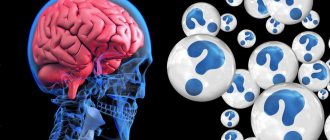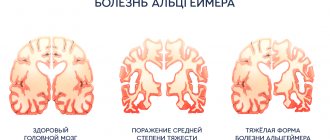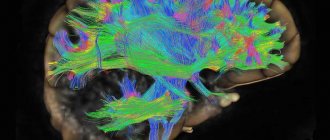Psychotherapist
Gartsev
Leonid Sergeevich
Psychotherapist, psychiatrist, narcologist
Make an appointment
Alzheimer's disease is the name of one of the forms of progressive dementia. The development of the disease leads to a gradual loss of cognitive functions in patients of the older age group (60-65 years). Persons suffering from senile dementia experience memory loss, decreased attention, loss of speech, spatial orientation, and basic thinking skills.
symptoms
First, increased forgetfulness or mild confusion may be the only symptom of Alzheimer's disease you notice. But over time, the disease robs you of more of your memory, especially recent memories. The rate at which symptoms worsen varies from person to person.
If you have Alzheimer's disease, you may be the first to notice that you have unusual difficulty remembering things and organizing your thoughts. Or you may be unable to admit that something is wrong, even if the changes are noticeable to your family, close friends, or co-workers.
Changes in the brain associated with Alzheimer's disease lead to increasing problems with:
Memory
Everyone experiences temporary memory errors. It's normal to lose track of where you put your keys or forget the name of a friend. But the memory loss associated with Alzheimer's disease persists and worsens, affecting your ability to function at work and at home.
People with Alzheimer's disease may:
- Repeating statements and questions over and over without realizing that they asked the question before
- Forget about conversations, meetings or events and don't remember them later.
- Lose possessions regularly, often placing them in illogical places
- Get lost in familiar places
- Eventually forget the names of family members and everyday objects
- Can't find the right words to identify objects, express thoughts, or take part in conversations
Thinking and reasoning
Alzheimer's disease causes difficulty concentrating and thinking, especially with abstract concepts such as numbers.
Multitasking is especially challenging, and it can be difficult to manage finances, balance checkbooks, and pay bills on time. These difficulties may develop into an inability to recognize and process numbers.
Making decisions and decisions
Responding effectively to everyday problems, such as burning food on the stove or unexpected driving, is becoming increasingly challenging.
Plan and perform familiar tasks
Follow-up activities that require sequential steps, such as planning, cooking, or playing a favorite game, become a struggle as the disease progresses. Eventually, people with advanced Alzheimer's disease may forget how to perform basic tasks such as dressing and bathing.
Changes in personality and behavior
The brain changes that occur with Alzheimer's disease can affect the way you act and feel. People with Alzheimer's disease may experience:
- depression
- apathy
- Social isolation
- Mood swings
- Mistrust in others
- Irritability and aggressiveness
- Changes in sleep habits
- Wandering
- Losing inhibitions
- Misconceptions, such as believing something has been stolen
Many important skills are not lost until very late in the illness. These include learning to read, dance and sing, enjoy old music, engage in crafts and hobbies, tell stories and reminisce.
This is because information, skills and habits learned early in life are among the last abilities to be lost as the disease progresses; the part of the brain that stores this information tends to be affected later in the course of the disease. Using these abilities can promote success and maintain quality of life even in the mild phase of the disease.
How it manifests itself
Symptoms of alcoholic dementia increase gradually. The severity of manifestations depends on the stage. At first it is quite difficult to notice the problem.
At first, changes in character and behavior are observed. Manifestations of infantilism and memory impairment occur.
This stage is still reversible with the right help. But without treatment, the pathological process continues to progress.
Gradually:
- the ability to analyze and draw conclusions disappears;
- attention deteriorates;
- it becomes difficult to switch from one task to another;
- the circle of interests is narrowing.
As the pathology develops, conservatism and pessimism appear. The patient is no longer interested in anything except alcohol and food.
Alcohol-induced dementia has characteristic symptoms, so changes are not difficult to notice.
causes
Scientists believe that for most people, Alzheimer's disease is caused by a combination of genetic, lifestyle and environmental factors that affect the brain over time.
In less than 5 percent of cases, Alzheimer's disease is caused by certain genetic changes that virtually guarantee that a person will get the disease.
Although the causes of Alzheimer's disease are not yet fully understood, its effect on the brain is clear. Alzheimer's disease damages and kills brain cells. A brain suffering from Alzheimer's disease has far fewer cells and far fewer connections between surviving cells than a healthy brain.
As more and more brain cells die, Alzheimer's disease causes the brain to shrink significantly. When doctors examine Alzheimer's brain tissue under a microscope, they see two types of abnormalities that are considered signs of the disease:
- Records. These clumps of protein, called beta-amyloid, can damage and destroy brain cells in several ways, including interfering with communication between cells. Although the ultimate cause of brain cell death in Alzheimer's disease is not known, the collection of amyloid beta on the outside of brain cells is a prime suspect.
- Bundles. Brain cells depend on internal support and transport systems to carry nutrients and other important materials throughout their long extensions. This system requires the normal structure and function of a protein called tau. In Alzheimer's disease, strands of the tau protein curl into abnormal tangles inside brain cells, causing the transport system to break down. This failure is also strongly associated with the decline and death of brain cells.
What does alcohol do to our brain?
The brain of a drunk person is similar to the brain of a person with Alzheimer's. All processes, connections and interactions in it are simplified and slowed down. As a result, it is more difficult for an intoxicated person to think and react to the environment and people.
What happens in your brain after a couple of glasses of whiskey or cognac? It would seem that alcohol leads to chaos in our brain: we think poorly, do not coordinate our movements very well, and our reactions slow down. However, scientists believe that alcohol affects our brain differently - all connections become simpler, and processes slow down. This creates a state of intoxication.
These conclusions were reached by a group of experts led by Professor Mike Noseworthy from McMaster University. For 26 years, scientists have been researching medical conditions that a person may experience.
Noseworthy's idea to analyze the state of the brain during alcohol intoxication was inspired by news he heard on the radio about the arrest of a drunk driver. The blood alcohol content is quite easy to determine using a test. But it is difficult to understand what the alcohol content is in the brain. You can't do a brain biopsy for this.
If we study the effect of alcohol on the human brain in more detail, we can determine the exact permissible amount of alcohol in the blood that is possible for drivers.
Scientists' experiment: how alcohol affects the brain
In 2013, the scientist and his team found 14 male volunteers: each of them drank 6 ounces of whiskey, which is approximately 170 grams. The scientists then took an MRI of each participant's brain.
They were interested in how signals of different frequencies interact with different molecules. On this basis, it became clear how much alcohol was circulating in a particular brain.
They also tested how the brain functions during intoxication. To do this, they used a special MRI method that shows oxygen levels.
Alcohol makes the brain simple and calm
Normally, activity in the brain is a complete chaos: there are many networks that interact with each other in completely unpredictable ways. This is what allows us to think, react to circumstances and solve problems.
When the brain is functioning poorly, such as in Alzheimer's disease, the networks appear much more stable and calm. It is more difficult for such people to think and get used to changes.
About the same thing happens when drinking alcohol: the more drunk we are, the less complex processes occur in the brain. Brain activity becomes calmer, and the structure of connections becomes less complex. This leads to the fact that a person begins to think poorly and reacts worse to the world around him. If you are heavily intoxicated, it is already difficult to interact with other people.
Chaotic activity in the brain is highlighted in blue. On the left is the brain of a sober person. In the middle is the brain of a man who has just drunk 170 grams of whiskey. And on the right is the brain of a man who drank whiskey an hour and a half ago
bg.ru
Risk factors
Age
Increasing age is the largest known risk factor for Alzheimer's disease. Alzheimer's is not part of normal aging, but your risk increases significantly after age 65. The rate of dementia doubles every ten years after age 60.
People with rare genetic changes associated with early-onset Alzheimer's disease begin to experience symptoms as early as age 30.
Family history and genetics
Your risk of developing Alzheimer's disease appears to be slightly higher if a first-degree relative—your parent or sibling—has the disease. Scientists have identified rare changes (mutations) in three genes that virtually guarantee that a person who inherits them will develop Alzheimer's disease. But these mutations account for less than 5 percent of Alzheimer's disease.
Most genetic mechanisms of Alzheimer's disease among families remain largely unexplained. The strongest risk gene researchers have discovered apolipoprotein e4 (APoE4) so far, although not everyone with this gene develops Alzheimer's disease. Other risk genes have been identified but not conclusively confirmed.
Down syndrome
Many people with Down syndrome develop Alzheimer's disease. Signs and symptoms of Alzheimer's disease tend to appear 10 to 20 years earlier in people with Down syndrome than in the general population. The gene contained on the extra chromosome that causes Down syndrome significantly increases the risk of Alzheimer's disease.
sex
Women appear to be more likely to develop Alzheimer's disease, in part because they live longer.
Mild cognitive impairment
People with mild cognitive impairment (MCI) have memory problems or other symptoms of cognitive decline that are worse than would be expected at their age, but are not severe enough to be diagnosed as dementia.
Those with MCI have an increased risk—but not certainty—of later developing dementia. Taking steps to develop healthy lifestyle habits and strategies to compensate for memory loss at this stage can help delay or prevent the progression of dementia.
Early head injury
People who have had severe head trauma appear to have a greater risk of Alzheimer's disease.
Lifestyle and heart health
There is no lifestyle factor that has been specifically proven to reduce your risk of Alzheimer's disease.
However, some evidence suggests that the same factors that put you at risk for heart disease may also increase your chance of developing Alzheimer's disease. Examples include:
- Lack of exercise
- obesity
- Smoking or exposure to secondhand smoke
- High blood pressure
- High blood cholesterol
- Poorly controlled type 2 diabetes
- Diet without fruits and vegetables
These risk factors are also associated with vascular dementia, a type of dementia caused by damaged blood vessels in the brain. Working with your healthcare team to plan to control these factors will help protect your heart and also help reduce your risk of Alzheimer's disease and vascular dementia.
Lifelong learning and social participation
Research has found a link between lifetime participation in mentally and socially stimulating activities and a reduced risk of Alzheimer's disease. Low levels of education—less than high school education—appear to be a risk factor for Alzheimer's disease.
Scientists: Moderate alcohol consumption protects against Alzheimer's disease
Thanks for subscribing
Please check your email to confirm your subscription
MOSCOW, August 2 – RIA Novosti. Moderate alcohol consumption was associated with a reduced risk of senile dementia and Alzheimer's disease for people of European descent, according to a paper published in the Journal of Alzheimer's Disease.
“Our study is unique in that we tracked changes in mental acuity and memory in older men and women and found that moderate alcohol consumption was associated not only with longevity, but also with a higher chance of remaining mentally sharp in old age.” — says Linda McEvoy from the University of California at San Diego (USA).
In recent years, scientists have increasingly debated whether alcohol is dangerous to human health in any quantity, or whether its moderate consumption can lead to beneficial consequences. Over the past three years, several groups of biologists have found signs that wine and many other light alcoholic drinks reduce the likelihood of getting a heart attack or diabetes, while other scientists, on the contrary, have stated that alcohol is not associated with increased life expectancy, as representatives of the first group stated. groups of researchers.
McAvoy and her colleagues found new evidence that drinking in moderation may benefit rather than harm the body by monitoring the health of 1,400 older Americans over 25 years, from 1984 to 2009.
Many of the participants in these observations lived to the age of 85, when many older people become victims of Alzheimer's disease and other forms of senile dementia, allowing scientists to estimate how much alcohol consumption affects its development.
As these observations showed, drinking relatively small amounts of alcohol, about 100-150 milliliters of wine or a glass of beer per day, was associated with a noticeable reduction in the risk of developing these brain problems. Older Americans who drank similar amounts of alcohol were about 2-3 times less likely to suffer from Alzheimer's disease, and lived on average longer than the typical US resident.
As scientists emphasize, the presence of such a connection between alcohol and the brain's high resistance to senescence does not necessarily mean that alcohol protects nerve cells from Alzheimer's disease. It is possible that such a relationship arose because McAvoy and her colleagues conducted the study in one of the most affluent areas of California, where there are no problems with crime, access to medicine, and “epidemics” of drug addiction and other bad habits.
“Our findings do not suggest that you need to start drinking alcohol all the time. Many people have other health problems that are exacerbated by alcohol, and many simply cannot limit themselves to one glass of drink a day. For such people, wine and beer will not help, but harm,” concludes Erin Richard, McAvoy’s colleague.
Version 5.1.11 beta. To contact the editors or report any errors you notice, use the feedback form.
© 2020 MIA "Russia Today"
The online publication RIA Novosti was registered with the Federal Service for Supervision of Communications, Information Technologies and Mass Communications (Roskomnadzor) on April 8, 2014. Certificate of registration El No. FS77-57640
Founder: Federal State Unitary Enterprise “International Information Agency “Russia Today” (MIA “Russia Today”).
Editor-in-Chief: Anisimov A.S.
Editorial office email address:
Editorial Phone: 7 (495) 645-6601
This resource contains materials 18+
Registration of a user in the RIA Club service on the Ria.Ru website and authorization on other sites of the MIA Rossiya Segodnya media group using a user account or accounts on social networks indicates agreement with these rules.
The user undertakes not to violate the current legislation of the Russian Federation by his actions.
The user undertakes to speak respectfully towards other discussion participants, readers and persons appearing in the materials.
Comments are published only in those languages in which the main content of the material under which the user posts the comment is presented.
On the websites of the MIA Rossiya Segodnya media group, comments can be edited, including preliminary editing. This means that a moderator checks comments for compliance with these rules after the comment has been posted by the author and made available to other users, and before the comment is made available to other users.
A user's comment will be deleted if it:
- does not correspond to the theme of the page;
- promotes hatred, discrimination on racial, ethnic, gender, religious, social grounds, infringes on the rights of minorities;
- violates the rights of minors, causes them harm in any form;
- contains ideas of an extremist and terrorist nature, calls for a violent change in the constitutional system of the Russian Federation;
- contains insults, threats against other users, specific individuals or organizations, discredits honor and dignity or undermines their business reputation;
- contains insults or messages expressing disrespect towards MIA Rossiya Segodnya or agency employees;
- violates privacy, distributes personal data of third parties without their consent, reveals the secret of correspondence;
- contains references to scenes of violence and cruelty to animals;
- contains information about methods of suicide, incites suicide;
- pursues commercial purposes, contains inappropriate advertising, illegal political advertising or links to other online resources containing such information;
- has obscene content, contains obscene language and its derivatives, as well as hints at the use of lexical units that fall under this definition;
- contains spam, advertises the distribution of spam, mass messaging services and resources for making money on the Internet;
- advertises the use of narcotic/psychotropic drugs, contains information about their production and use;
- contains links to viruses and malicious software;
- is part of an action in which a large number of comments are received with identical or similar content (“flash mob”);
- the author abuses writing a large number of messages with little content, or the meaning of the text is difficult or impossible to grasp (“flood”);
- the author violates online etiquette by exhibiting forms of aggressive, bullying and offensive behavior (“trolling”);
- the author shows disrespect for the Russian language, the text is written in Russian using the Latin alphabet, is entirely or predominantly typed in capital letters or is not divided into sentences.
Please write correctly - comments that show disregard for the rules and norms of the Russian language may be blocked, regardless of the content.
The administration has the right, without warning, to block a user’s access to the page in the event of a systematic violation or a one-time gross violation of the commenting rules by a participant.
The user can initiate the restoration of his access by writing an email to
The letter must indicate:
- Topic – access restoration
- User login
- Explanations of the reasons for actions that were a violation of the above rules and resulted in blocking.
If the moderators deem it possible to restore access, this will be done.
In case of repeated violation of the rules and repeated blocking, the user’s access cannot be restored; in this case the blocking is complete.
ria.ru
complications
Memory and language loss, impaired judgment and other cognitive changes caused by Alzheimer's disease can make other health conditions more difficult to treat. A person with Alzheimer's disease may not be able to:
- Communicate that he or she is in pain—for example, from a dental problem
- Report symptoms of another illness
- Follow the prescribed treatment plan
- Notify or describe side effects of the drug
As Alzheimer's disease progresses into its final stages, brain changes begin to affect physical functions such as swallowing, balance, bowel and bladder control. These effects may increase vulnerability to additional health problems such as:
- Inhaling food or liquid into the lungs (aspiration)
- Pneumonia and other infections
- Falls
- Fractures
- Bedsores
- Malnutrition or dehydration
Diagnostics
Doctors have identified some causes that can accelerate the onset of Alzheimer's disease, causing symptoms to appear ahead of time. Factors that increase the signs of Alzheimer's disease are:
- Finding a patient in a new, unfamiliar environment.
- Long stay in hot climate.
- Sudden communication with strangers and people unfamiliar to the patient.
- Long stay in isolation.
- When the patient is affected by an infectious disease.
- If the patient takes a large amount of various medications.
To make an accurate diagnosis, it will be necessary to conduct laboratory and hardware tests:
- donate blood for clinical analysis.
- get tested for syphilis and HIV.
- do an MRI of the brain.>
- do an ECG.
- get tested for hormones.
- do an ultrasound of the thyroid gland.
- perform a cerebrospinal fluid biopsy.
Do not self-medicate if you notice the first signs of the disease, do not try to treat Alzheimer’s disease with folk remedies, but immediately go to a specialist to get a test done.
prevention
Right now, there is no proven way to prevent Alzheimer's disease. Research into prevention strategies continues. The strongest evidence so far suggests that you can reduce your risk of developing Alzheimer's disease by reducing your risk of heart disease.
Many of the same factors that increase the risk of heart disease can also increase the risk of developing Alzheimer's disease and vascular dementia. Important factors that may be involved are high blood pressure, high blood cholesterol, excess weight and diabetes.
The Mediterranean diet—a way of eating that emphasizes fresh produce, healthy oils, and foods low in saturated fat—may reduce the risk of death from heart disease and stroke. This diet has also been associated with a reduced risk of Alzheimer's disease.
Staying active—physically, mentally and socially—can make your life more enjoyable and may also help reduce your risk of Alzheimer's disease.
Today there is no specific test to confirm that you have Alzheimer's disease. Your doctor will judge whether Alzheimer's disease is the most likely cause of your symptoms based on the information you provide and the results of various tests that can help make a diagnosis.
Doctors can almost always tell if you have dementia, and they can often tell if your dementia is related to Alzheimer's disease. Alzheimer's disease can only be diagnosed with complete certainty after death, when microscopic examination of the brain reveals characteristic plaques and tangles.
To help distinguish Alzheimer's disease from other causes of memory loss, doctors now typically rely on the following types of tests.
Physical and neurological exam
Your doctor will perform a physical examination and will likely evaluate your overall neurological health by checking your:
- reflexes
- Muscle tone and strength
- Ability to get up from your chair and walk around the room
- Sense of sight and hearing
- coordination
- Balance
Laboratory tests
Blood tests can help your doctor rule out other potential causes of memory loss and confusion, such as thyroid disorders or vitamin deficiencies.
Mental status and neuropsychological testing
Your doctor may administer a brief mental state test to evaluate your memory and other thinking skills. In addition, your doctor may suggest a more extensive assessment of your thinking and memory. Longer forms of neuropsychological testing may provide additional information about your mental function compared to others of a similar age and education level.
Brain Imaging
Brain imaging is now used primarily to identify visible abnormalities associated with conditions other than Alzheimer's disease, such as strokes, injuries or tumors, which can cause cognitive changes. New imaging applications, currently used primarily at large medical centers or in clinical trials, could allow doctors to identify specific brain changes caused by Alzheimer's disease.
Brain imaging technologies include:
- Magnetic resonance imaging (MRI). An MRI uses radio waves and a strong magnetic field to produce detailed images of your brain. MRI scans are used to rule out other conditions that may explain or add to cognitive symptoms. They can also be used to assess whether shrinkage has occurred in areas of the brain involved in Alzheimer's disease.
- Computed tomography (CT). A CT scan creates cross-sectional images (slices) of your brain. Currently, it is used primarily to rule out tumors, strokes, and head injuries.
- Positron emission tomography (PET). During a PET scan, you will be injected into a vein with a low-level radioactive tracer. The tracer may be a special form of glucose (sugar) that shows overall activity in different areas of the brain. This can show which parts of your brain are not functioning well. New PET scan techniques can detect your brain's levels of plaque (amyloid) and tangle (tau), two hallmarks associated with Alzheimer's disease. However, these new PET techniques are usually discovered in research settings or clinical trials.
- Cerebrospinal fluid. In special cases, such as rapidly progressing dementia or dementia, a cerebrospinal fluid test may be performed. Spinal fluid may be tested for biomarkers that indicate the likelihood of Alzheimer's disease.
Future diagnostic tests
Researchers are working with doctors to develop new diagnostic tools that will help definitively diagnose Alzheimer's disease. Another important goal is to detect a disease before it causes symptoms.
New tools being researched include:
- Additional Brain Imaging Approaches
- More sensitive intelligence tests
- Measuring key proteins or protein structures in the blood or cerebrospinal fluid (biomarkers)
Genetic testing is not generally recommended for routine evaluation of Alzheimer's disease. The exception is people who have a history of early onset Alzheimer's disease. However, anyone with a family history of early-onset Alzheimer's disease should meet with a genetic counselor to discuss the risks and benefits of genetic testing.
Basic information about the disease
Alcoholic dementia is characterized, first of all, by severe disruptions in mental functions that develop against the background of a persistent addiction to alcoholic beverages.
The symptoms are always almost the same: the patient loses the ability to normally perceive the surrounding reality, he has a disturbance in thinking and speech functions, and his ability to concentrate and remember deteriorates
Alcohol-induced dementia is not an independent disease. It occurs as a secondary deviation accompanying the main disorder. For patients with alcohol dependence who have symptoms of the pathological condition in question, one recommendation can be given: to visit a doctor specializing in the field of addiction and psychiatry.
The doctor will examine the patient’s condition in general and the characteristics of the deterioration of his mental abilities in particular, and then prescribe adequate individual treatment.
treatment
drugs
Current medications for Alzheimer's disease may help temporarily with memory symptoms and other cognitive changes. There are currently two types of medications used to treat cognitive symptoms:
- Cholinesterase inhibitors. These drugs work by increasing the level of exchange between cells, providing a neurotransmitter (acetylcholine) that is depleted in the brain in Alzheimer's disease. The improvement is modest. Cholinesterase inhibitors may improve neuropsychiatric symptoms such as agitation or depression. Commonly prescribed cholinesterase inhibitors include donepezil (Aricept), galantamine (Razadyne), and rivastigmine (Exelon). The main side effects of these drugs are diarrhea, nausea, loss of appetite and sleep disturbances. In people with cardiac conduction problems, serious side effects may include slow heart rate and heart block.
- Memantine (Namenda). This drug works in a different network of brain cells and slows the progression of symptoms in moderate to severe Alzheimer's disease. It is sometimes used in combination with a cholinesterase inhibitor. Side effects may include constipation, dizziness, and headache.
Sometimes other medications, such as antidepressants, are used to help control behavioral symptoms associated with Alzheimer's disease. But some medications should be used with great caution. For example, some common sleep medications—zolpidem (Ambien), eszopiclone (Lunesta), and others—may increase confusion and the risk of falling.
The anti-anxiety medications clonazepam (Klonopin) and lorazepam (Ativan) increase the risk of falling, confusion, and dizziness. Always check with your doctor before taking any new medications.
Creating a safe and supportive environment
Adapting the life situation to the needs of the person with Alzheimer's disease is an important part of any treatment plan. For someone with Alzheimer's disease, creating and strengthening habits and minimizing tasks that require memory can make life much easier.
You can take the following steps to support a person's sense of well-being and ability to function:
- Always keep keys, wallets, cell phones and other valuables in one place in the house to prevent them from getting lost.
- See if your doctor can simplify your medication regimen to a single dosage and set up automatic payments and auto-deposits.
- Develop the habit of carrying a location-enabled mobile phone so that you can call if you are lost or confused and people can track your location through the phone. Also, program important phone numbers into your phone so you don't have to try to remember them.
- Make sure that regular meetings are done on the same day at the same time whenever possible.
- Use a calendar or whiteboard at home to keep track of your daily schedules. Create a habit of checking completed items so you can be sure they were completed.
- Remove excess furniture, declutter and throw away rugs.
- Install strong handrails on stairs and in bathrooms.
- Make sure your shoes and slippers are comfortable and provide good traction.
- Reduce the number of mirrors. People with Alzheimer's disease may find images in mirrors confusing or frightening.
- Store photos and other significant objects around your home.
Exercise
Regular exercise is an important part of everyone's health plan, and those with Alzheimer's disease are no exception. Activities such as a daily walk can improve your mood and keep your joints, muscles and heart healthy.
Exercise can also promote restful sleep and prevent constipation. Make sure the person with Alzheimer's disease carries an identification number or wears a medical warning bracelet if he or she is walking unaccompanied.
People with Alzheimer's disease who develop problems walking can still use a stationary bicycle or participate in chair-based exercises. You can find exercise programs designed for older adults on television or on DVDs.
nutrition
People with Alzheimer's disease may forget to eat, lose interest in cooking, or fail to eat a healthy combination of foods. They may also forget to drink enough, leading to dehydration and constipation.
Offers:
- High calorie, healthy smoothies and shakes. You can supplement milkshakes with protein powders (available at grocery stores, pharmacies and discount retailers) or use your blender to make shakes with your favorite ingredients.
- Water, juices and other healthy drinks. Try to ensure that the person with alcohol Alzheimer's drinks at least several full glasses of liquid daily. Avoid caffeinated drinks, which can increase anxiety, interfere with sleep, and cause a frequent need to urinate.
Some dietary supplements are marketed as "medicinal products" specifically for the treatment of Alzheimer's disease. The Food and Drug Administration (FDA) does not approve products sold as medical products. Despite marketing claims, there is no definitive data showing that any of these supplements are beneficial or safe.
What does treatment for alcoholic dementia include?
It is very difficult and not even always possible to completely cure an alcoholic facing alcoholic dementia. Things are especially bad if the addict seeks qualified drug treatment in the final stages of the disease. To slow down the further development of dementia and make mental impairment less pronounced, it is imperative to undergo comprehensive treatment for alcohol dependence. It is important that a person gives up drinking forever and makes a conscious decision to become completely healthy. Treatment for alcoholic dementia includes:
- Drug therapy. The patient is prescribed medications that improve brain nutrition and normalize metabolic reactions. During treatment, nootropics, vascular agents, antioxidants, and medications that normalize blood pressure and prevent the development of diseases of the liver, kidneys, and gastrointestinal tract may be used.
- Use of psychotherapeutic techniques. In the fight against dementia, a non-trivial approach with a kind of psychological shock is used. The patient is forced to think about the sad consequences that he will face if he continues to drink further. If he refuses to communicate with a psychotherapist, interventionists are involved in working with him. They know how to convince even the most difficult patients.
- Rehabilitation. The patient takes walks in the fresh air, engages in light physical activity, and attends health-improving procedures. Spa and rehabilitation treatment allows you to minimize the negative symptoms of dementia and inhibit its further progression.
Treating alcohol-induced dementia is always difficult. Therapy must be prescribed by a qualified narcologist. Psychotherapists, psychologists, and neurologists are also involved in the treatment. If someone close to you is facing dementia, be sure to take steps to help the patient. To do this, call our drug treatment clinic “Verimed” by phone +7 . We will advise you on the best course of action, prescribe and carry out treatment that will improve the condition of the addict.
Lifestyle and Home Remedies
Research results are mixed on whether diet, exercise or other healthy lifestyle options can prevent or reverse cognitive decline. But these healthy choices promote good overall health and can play a role in maintaining cognitive health, so there's no harm in incorporating these strategies into your overall wellness plan:
- Regular exercise, especially cardiovascular exercise, has benefits for heart health and may also help prevent cognitive decline. Exercise can also help improve your mood.
- A diet low in fat and rich in fruits and vegetables is another heart-healthy choice that can also help protect cognitive health.
- Social involvement and intellectual stimulation can make life more satisfying and help maintain mental function.
Alternative medicine
Various herbal mixtures, vitamins and other supplements are widely promoted as drugs that may support cognitive health or prevent or delay Alzheimer's disease. There is currently no convincing evidence that any of these therapies slow the progression of cognitive decline.
Some of the recently reviewed treatments include:
- Omega-3 fatty acids. Omega-3 fatty acids in fish may help prevent cognitive decline. However, studies conducted on fish oil supplements have shown no benefit.
- Curcumin. This herb comes from turmeric and has anti-inflammatory and antioxidant properties that can affect brain chemistry. So far, clinical trials have not found any benefit for treating Alzheimer's disease.
- Ginkgo. Ginkgo is a plant extract containing several substances. A large NIH-funded study found no effect in preventing or slowing Alzheimer's disease.
- Vitamin E: Although vitamin E is not effective in preventing Alzheimer's disease, taking two thousand international units daily may help slow the progression in people who already have the disease. However, study results have been mixed, with only a few showing this benefit. Further research into the safety of 2000 International Units daily Vitamin E in dementia populations will be needed before it can be routinely recommended.
Supplements that promote cognitive health may interact with medications you take for Alzheimer's disease or other health conditions. By working closely with your healthcare team, you will create a treatment plan that is right for you. Make sure you understand the risks and benefits of everything involved.
Classification
Dementia from alcoholism can occur if the cerebral cortex, the layer underneath the cortex, or other parts of the nervous system are affected.
The most commonly diagnosed form of dementia is the cortical form. In this situation, the condition of the areas that control consciousness and memory deteriorates.
In the subcortical form, the transmission of nerve impulses from the cerebral cortex to the underlying sections is disrupted. The manifestations of the problem are not as pronounced as with cortical lesions, but mental health also deteriorates. In this case, inhibition of thinking, deterioration of mood, apathy, and depression are observed.
If the cerebral vessels are damaged, then the situation worsens due to alcohol consumption and the cerebral cortex and areas under it are affected.
Alcohol-induced dementia can be multifocal, with multiple foci of necrosis and degeneration. Any part of the organ can be affected, and the manifestations depend on this. This species is characterized by rapid development. A few months are enough for complete personality degradation.
Taking into account how large the area of the brain is affected, total and lacunar forms are distinguished. The first option develops if blood flow in the frontal lobes of the brain is disrupted. This is accompanied by a gradual disintegration of personality. A person loses a sense of shame, intellectual abilities, and his circle of interests narrows.
With lacunar dementia, there is damage to certain brain structures, which affects short-term memory.
The pathological process develops in several stages:
- Easy. In this situation, the patient can still critically assess his condition, but his intellectual capabilities are significantly impaired. The patient cannot do without the help of others.
- Moderate. At this stage, criticism and intelligence decrease. A person experiences difficulties when using phones, televisions, and cannot open the lock with a key. He should not be left alone and it is important to provide adequate care.
- Heavy. This diagnosis is made when personality is completely lost. A person cannot eat food or perform hygiene procedures on his own and requires constant supervision.
Copying and support
People with Alzheimer's disease experience a mixture of emotions - confusion, frustration, anger, fear, uncertainty, grief and depression.
If you are caring for someone with Alzheimer's disease, you can help them cope with the disease by listening to them, reassuring the person that life can still be used, providing support, and doing your best to help the person maintain their dignity and self-confidence, respect.
A calm and stable home environment can help reduce behavior problems. New situations, noise, large groups of people who are rushed or forced to remember or ask to do difficult tasks can cause anxiety. As a person with Alzheimer's disease becomes upset, their ability to think clearly decreases even further.
Caregiver care
Caring for a person with Alzheimer's disease is physically and emotionally demanding. Feelings of anger and guilt, stress and frustration, anxiety and grief, and social isolation are common.
Caregiving can even take a toll on the caregiver's physical health. But paying attention to your own needs and well-being is one of the most important things you can do for yourself and for the person with Alzheimer's disease.
If you are a caregiver for someone with Alzheimer's disease, you can help yourself by:
- Learning as much about the disease as you can
- Asking questions to doctors, social workers, and others involved in your loved one's care
- Call on friends or other family members for help when you need it
- Daily break
- Spend time with friends
- By taking care of your health by seeing your doctors on schedule, eating healthy and exercising
- Joining a support group
- Using a local adult center if possible
Many people living with Alzheimer's disease and their families receive counseling or local support services. Contact your local Alzheimer's Association affiliate for support groups, doctors, occupational therapists, resources and referrals, home care agencies, residential care facilities, helplines, and training seminars.
What kind of diet is this?
Studying the effect of different foods on brain activity allowed nutritionists to draw conclusions about the benefits and harms of two groups of foods for the brain.
As it turned out, they are all related to two diets that have long been recognized by official medicine: the DASH diet (Dietary Approaches to Stop Hypertension) and the Mediterranean type of nutrition.
Mediterranean cuisine has long been known as one of the healthiest cuisines, and DASH was developed for patients with hypertension. At the intersection of these two approaches, the MIND diet was born. As the name suggests (mind translated from English means mind, mind), it is designed specifically for those who strive to maintain a sound mind into their old age.
The diet has a very beneficial effect not only on the cognitive functions of the brain, that is, it preserves memory and thinking efficiency, but can also reduce the likelihood of Alzheimer's disease by 50%.
This diet also improves mood, improves emotional well-being and helps fight depression.
Among the nutritional principles underlying this diet are the avoidance of 5 unhealthy foods and the mandatory inclusion of 10 brain-healthy foods several times a week.
Preparing for your appointment
You may decide that you want to talk to your doctor about memory loss or other cognitive changes, or you may seek advice from a family member who will arrange your appointment and go with you. You'll likely start by seeing your primary care physician, who may then refer you to a neurologist, psychiatrist, neuropsychologist, or other specialist for further evaluation.
Since meetings can be brief and there is often a lot of ground to cover, it's a good idea to prepare in advance. Here are some tips to help you prepare for your appointment and understand what to expect from your doctor.
What can you do
- Be aware of any prior restrictions. When you make your appointment, ask if you need to fast for blood work or if you need to do anything else to prepare for diagnostic tests.
- Write down all your symptoms. Your doctor will want to know more about your concerns about your memory or mental function. Make notes about some of the most important examples of forgetfulness or other omissions that you want to mention. Are you having trouble finding your keys or have you found your keys in the freezer? Try to remember when you first started to suspect that something might be wrong. If you think your difficulties are getting worse, be prepared to explain why.
- Bring a family member or friend with you if possible. Hearing from a relative or trusted friend can help your doctor know the extent of your difficulties. Having someone nearby can help you remember information provided during your appointment.
- Make a list of other medical conditions. Your doctor will want to know if you are currently being treated for diabetes, heart disease, past strokes, or any other conditions.
- Make a list of all your medications, including over-the-counter medications and vitamins or supplements you take, along with the dosage of each medication.
Questions to ask your doctor
Writing a list of questions will help you make the most of your assignment. If you see your doctor about Alzheimer's disease, some questions to ask include:
- Is my degree of memory change normal for someone my age?
- If not, do you think my symptoms may be caused by Alzheimer's disease?
- What tests do I need?
- If I am diagnosed with Alzheimer's disease, will you or another physician manage my ongoing care? Can you help me create a plan for ongoing care?
- What treatments or programs are available? How effective are these treatments?
- Will medications help? What are the possible side effects?
- Are there any clinical trials for experimental treatments that I should consider?
- How is my disease likely to progress over time?
- Will my new symptoms affect how I manage my other health conditions?
- Do you have any brochures or other printed materials that I can take home with me? What support sites and resources do you recommend?
What to expect from your doctor
Your doctor may also have questions for you. By being prepared to respond, you can free up time to focus on whatever issues you want to talk about. Your doctor may ask:
- What memory problems and mental retardations do you have? When did you first notice them?
- Are they constantly getting worse, or are they sometimes better and sometimes worse?
- Have you stopped doing certain activities, such as managing your finances or shopping, because those activities were too mentally demanding?
- Do you feel sadder or more anxious than usual?
- Have you recently gotten lost on a driving route or in a situation that is usually familiar to you?
- Has anyone expressed unusual concern about your driving?
- Have you noticed any changes in the way you respond to people or events?
- Do you have more energy than usual, less energy than usual, or about the same?
- What medications do you take? Do you take any vitamins or supplements?
- You drink alcohol? How many?
- Did you notice any shaking or running?
- Do you have trouble remembering your medical appointments or when you take medications?
- Have you recently had your hearing and vision tested?
- Has anyone else in your family had memory problems? Has anyone ever been diagnosed with Alzheimer's disease or dementia?
- Do you play out your dreams while you sleep (hitting, clinging, screaming, screaming)? You `re snoring?
- Are you depressed? How are you?
Share link:
- Click to share on Twitter (Opens in new window)
- Click here to share content on Facebook. (Opens in a new window)
- Click to share on Telegram (Opens in new window)
Liked this:
Like












